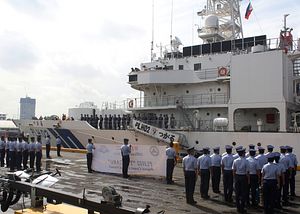Japan’s Coast Guard plans to establish an organization to help ASEAN countries in the maritime domain, Japanese media reported over the weekend.
As I have emphasized before, Japan has had longstanding relationships with Southeast Asian states and with ASEAN as a whole as one of the subregion’s oldest and most important dialogue partners, with decades of cooperation stretching across economics, business, culture, and even in the security realm despite remaining domestic restrictions (See: “Japan’s ASEAN Charm Offensive”).
But since Prime Minister Shinzo Abe’s return to office in December 2012, Japan has invested more in the defense side of its Southeast Asian relationships. Maritime security has unsurprisingly been a focus, since one driver of growing ASEAN-Japan cooperation is shared anxiety about China’s assertiveness in the East China Sea and South China Sea. Indeed, when Japanese Defense Minister Tomomi Inada unveiled the Vientiane Vision – Japan’s first comprehensive, regionwide initiative for defense cooperation – at the second ASEAN-Japan Defense Ministers’ Informal Meeting last month, one of the key areas was maritime security (See: “Japan Reveals First ASEAN Defense Initiative with Vientiane Vision”).
Now, in the latest sign of this burgeoning ASEAN-Japan collaboration in the maritime security domain, Kyodo News reports that Japan is planning to set up a new body dedicated to this field. The new organization, intended for launch in April, would have a staff of seven and will help enhance capacity-building for Southeast Asian states through various initiatives including training and international symposiums on maintaining the rules-based maritime order.
If and when it is realized, the new body could end up constituting a significant step for Japan’s region-wide engagement in this field. Beyond the ASEAN countries Japan already has more advanced partnerships with in the maritime security realm, such as the Philippines and Vietnam, or others like Malaysia and Indonesia who have their own coast guards (not all Southeast Asian states do), the body would also engage other less capable or less prominent maritime actors, enabling Tokyo to play a role in shaping their future outlooks.
Some of the trainees, for instance, will reportedly be invited from Thailand and Myanmar. If Japan does indeed kick off the initiative by involving a wider range of actors in Southeast Asia, this would make sense optics-wise as it would prevent it from being cast as an exclusively South China Sea-centric project (as some will inevitably attempt to do). Thailand and Myanmar are both non-claimants in the South China Sea disputes but are nonetheless important maritime actors alongside the Andaman Sea and the Bay of Bengal.
That said, it is still early days. With respect to the initiative itself, the specifics needed to truly assess its significance and implications at a more granular level, such as its scope and budget, have yet to be publicly unveiled. It will also be interesting to see how this interacts with other changes happening in the maritime security realm within Japan, including the role of the coast guard itself, which received its largest-ever funding in Japan’s 2017 defense budget revealed last month.
Of course, the initiative will also be influenced by Japan’s relationships with individual Southeast Asian states as well as Tokyo’s other key regional partners in the Indo-Pacific, including Australia and the United States. We will know a little more about the state of Japan’s ties with a few ASEAN states in the coming weeks, with Abe expected to visit several Southeast Asian capitals soon. And with respect to Tokyo’s relationships with other important regional partners, all eyes will be on the first summit meeting between him and Donald Trump following his inauguration on January 20 to see what the two allies will be able to do together in the maritime security realm.

































